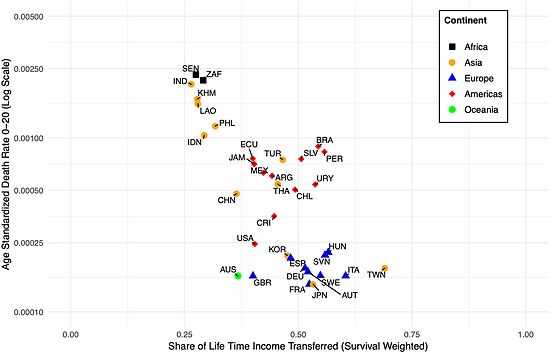Laboratory
Population Dynamics and Sustainable Well-Being
At a Glance
Projects
Publications
Team
Project
Intergenerational Transfers and Demographic Outcomes
Ole Hexel, Diego Alburez-Gutierrez, Emilio Zagheni; in Collaboration with Fanny Annemarie Kluge (State of Berlin, Germany)
We study generational resource sharing via different transfer mechanisms around the globe. A major goal is to assess the impact of transfers on health, well-being, and survival, and to look at the influence of mortality, demographic processes, and kinship structures on transfers. Detailed Description
Mortality risk according to generosity of the country

The risk of dying at young ages is lower in more generous countries (Fig. 2 from Vogt, Kluge, and Lee 2020. Age-standardized risk of death age 0 to 20 and share of lifetime income transferred to others.) © https://www.pnas.org/doi/full/10.1073/pnas.1920978117
Intergenerational Relationships
Publications
Hexel, O.; Alburez-Gutierrez, D.; Zagheni, E.:
MPIDR Working Paper WP-2024-008. (2024)

Kluge, F. A.; Vogt, T.:
In: Ageing and fiscal challenges across levels of government, 63–76. Paris: OECD Publishing. (2020)

Vogt, T. C.; Kluge, F. A.; Lee, R.:
Proceedings of the National Academy of Sciences of the United States of America 117:37, 22793–22799. (2020)

Kluge, F. A.; Goldstein, J. R.; Vogt, T. C.:
Journal of the Economics of Ageing 13, 45–54. (2019)

Kluge, F. A.:
In: Grünbuch Alternde Gesellschaft: wie das "neue Altern" unser Leben verändern wird, 27–30. München: Max-Planck-Gesellschaft zur Förderung der Wissenschaften e.V. (2017)
